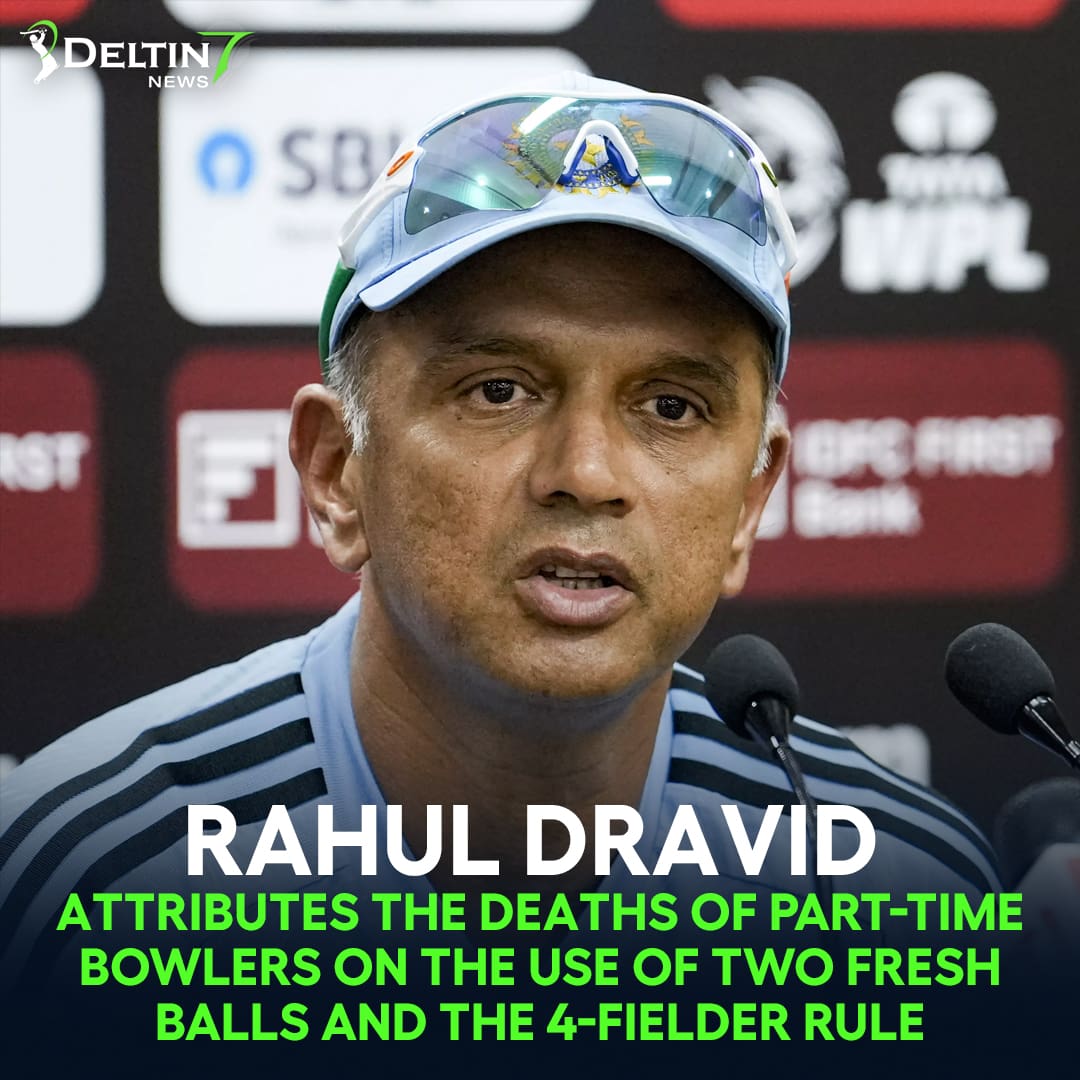
The fall of part-time bowlers in international teams has been a notable trend in the constantly changing world of limited-overs cricket. The head coach of India, Rahul Dravid, discusses the causes of this slide and emphasizes that rule modifications are the main culprit. The importance of part-time bowlers has been severely reduced with the introduction of two new balls and the restriction of four fielders outside the 30-yard circle during the second powerplay (from the eleventh to the forty-first over). Not only India, but also other cricket-playing nations, have been influenced by this change. We examine the causes of this change and its effects in more detail in this article.
Dravid cites a substantial rule change in the second powerplay that has taken place in international cricket since 2015 as a key contributor to the demise of part-time bowlers. The limitations on teams’ ability to have more than four fielders outside the 30-yard circle make bowlers’ jobs more difficult during this important part of the game.
“I think it’s because of the rule change,” Dravid said. You suddenly have five fielders inside the ring instead of the previous four. I believe it has significantly altered a part-time bowler’s capacity to bowl in the middle phase.
Dravid points out that other cricketing nations have also seen a reduction in part-time bowlers, indicating that the effects of these regulation changes go beyond the Indian cricket squad. Part-timers have historically been used by teams like England, Australia, Pakistan, Sri Lanka, and others to contribute with the ball during the middle overs. These athletes are, however, getting harder to find on international teams.
“If you notice, the number of part-time bowlers has decreased in other teams as well,” Dravid continued. The Indian team isn’t the only one.
Along with the regulation modifications, the adoption of two new balls for ODIs has made things even harder for part-time bowlers. It is more challenging for bowlers to produce reverse swing or get assistance from older balls when both balls are still shiny.
This point was emphasized by Dravid, who said, “You have got five fielders in the ring in the middle overs; partly, it is because of two new balls as well. The challenge of bowling is increasing for part-time bowlers.
The fall of part-time bowlers has also been significantly impacted by the change of India’s batting order. India once had a number of batters who could contribute with the ball, including Virender Sehwag, Sachin Tendulkar, Yuvraj Singh, Suresh Raina, and Yusuf Pathan. However, the number of multifaceted players has decreased recently due to the advent of specialist batsmen.
When asked about this change, Dravid said, “In the current World Cup team, India doesn’t have anyone who can chip in with a couple of overs.”
The number of part-time bowlers may be declining, but the coaching staff and players are always trying to improve. Dravid urged that players continue to train bowling in the nets despite the restricted opportunities for part-time bowlers in international games. However, a lack of exposure to matches may impede their development.
It’s not that they aren’t bowling in the nets, Dravid said; many batsmen do bowl in the nets. It is quite challenging to improve your skill if you don’t have the chance to bowl in the middle.
Part-time bowlers must compete for practice time with specialized bowlers and hitters, but net sessions are essential to developing their skills. Dravid understood how crucial it was to strike a balance between batting and bowling drills in the nets.
He stated, “It becomes really tough to enhance your technique if you don’t get opportunities to bowl in the center. We are attempting to resolve this. It’s not that we don’t try to improve it; we do. We also try to improve the batting abilities of some of our bowlers.
In his book “Coaching Beyond: My Days With The Indian Cricket Team,” former India fielding coach R Sridhar provided insights into the decrease of part-time bowlers. In net sessions, where expert bowlers predominate during practice time, he partly ascribed it to the prevalence of throwdown specialists.
One of the primary causes of that, according to Sridhar, is our coaching program. We have three specialized throwdown experts on the Indian squad right now, as we have for a while, and we typically receive four nets. Two nets are utilized for full-fledged bowling, and someone is always looking for extra batting space in the other two.
Part-time bowlers in international limited-overs cricket have virtually disappeared as a result of rule changes, the introduction of two new balls, and changing batting lineups, among other things. There is still a determined attempt to sustain and improve the skills of part-time bowlers through net sessions, despite the fact that these developments have had an impact on India and other cricketing nations. For players to develop into multifaceted athletes, practice time must be split evenly between bowling and batting. The difficulties faced by part-time bowlers will require adaptability and skill development as cricket continues to develop.
Desert Vipers vs Dubai Capitals ,DV vs DC T20 Match Bold Prediction for Today's Exciting…
MI Cape Town vs Paarl Royals, MICT vs PR T20 Match Prediction, Today's Thrilling Match…
Rangpur Riders vs Khulna Tigers BPL T20, Today Match Prediction & Expert Team Review RGR…
Pakistan vs West Indies, PAK vs WI 2nd Test Match Prediction, Analysis & Thrilling Review…
Sydney Sixers vs Sydney Thunder BBLT20, Today Thrilling Match Prediction & Detailed Review SYS vs…
Australia vs England Women Ashes T20, Expert Match Prediction & Winning Insights AUS-W vs ENG-W…